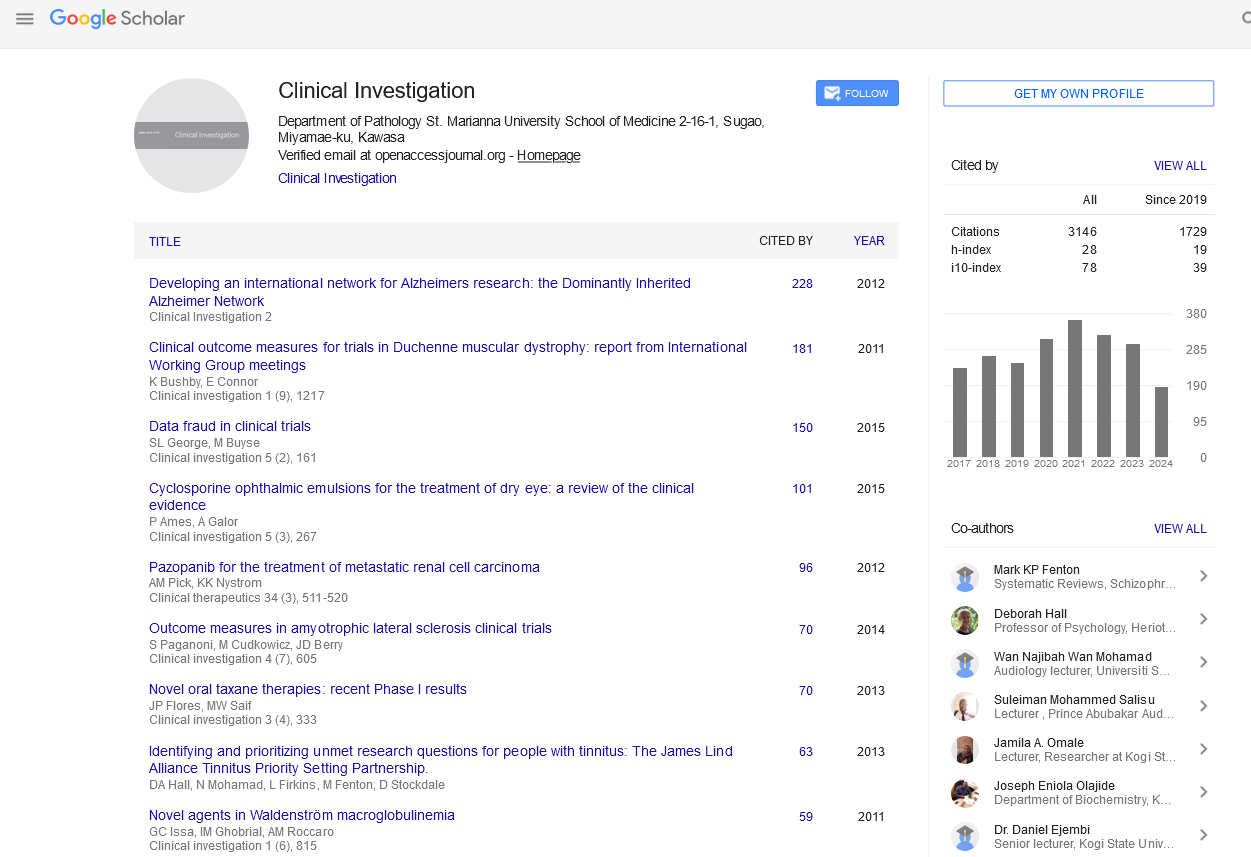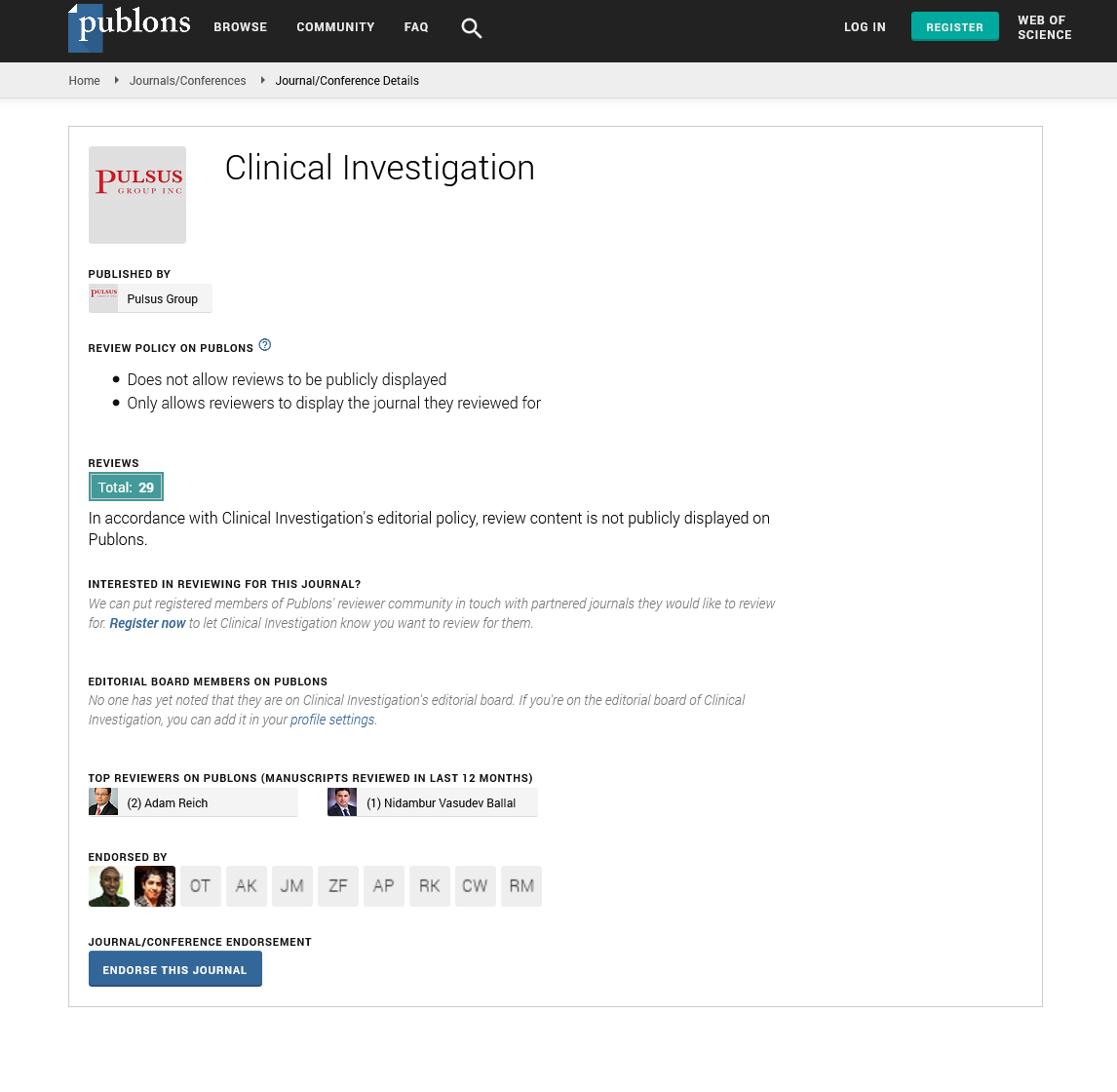Perspective - Clinical Investigation (2024) Volume 14, Issue 1
Biomedical Research: Advancements and Impact on Modern Healthcare
- Corresponding Author:
- Rohan Mehta
Indira Gandhi University, Faculty of Biology, India
E-mail: rohanmehta@gmail.com
Received: 4-Jan-2024, Manuscript No. fmci-24-159149; Editor assigned: 6-Jan-2024, PreQC No. fmci- 24-159149(PQ); Reviewed: 12-Jan-2024, QC No. fmci-24-159149(Q); Revised: 19-Jan-2024, Manuscript No. fmci-24-159149(R); Published: 25-Jan-2024
Keywords
Biomedical research • Healthcare • Drug development • Genetics • Molecular biology • Clinical trials • Disease mechanisms • Public health • Innovation
Introduction
Biomedical research is a broad field that aims to uncover the biological processes behind diseases and develop effective treatments. It encompasses various disciplines, including molecular biology, genetics, pharmacology, immunology, and clinical research. The ultimate goal of biomedical research is to translate scientific discoveries into real-world applications that can improve human health.
The field of biomedical research has led to many groundbreaking discoveries in recent decades, ranging from the development of life-saving drugs to advancements in diagnostic techniques and medical devices. With the rapid pace of technological progress and the growing understanding of human biology, biomedical research continues to hold immense potential for tackling global health challenges.
This article explores key areas of biomedical research, examines its impact on modern healthcare, and discusses the future prospects of the field.
Key areas of biomedical research
• Molecular biology and genetics: Molecular biology and genetics form the foundation of biomedical research by investigating how genes and proteins function in the body. Advances in genetic sequencing technologies, such as Next-Generation Sequencing (NGS), have allowed researchers to identify genetic mutations associated with a wide range of diseases, including cancer, heart disease, and neurological disorders. Gene therapy, a promising area of research, aims to correct defective genes to treat genetic disorders, offering new hope for patients with conditions like cystic fibrosis and muscular dystrophy.
• Drug development: Drug development is one of the most significant applications of biomedical research. Researchers identify targets in the body, such as proteins or enzymes, that play a role in disease development. Once a target is identified, scientists develop drugs that can either inhibit or stimulate these targets to treat the disease. The development of targeted therapies and biologic drugs has revolutionized the treatment of many diseases, including cancer and autoimmune disorders. Immunotherapy, for example, is a groundbreaking treatment for cancer that enhances the body’s immune system to fight tumor cells.
• Immunology and vaccine development: Immunology is a key area of biomedical research that focuses on the body's immune system and its role in defending against infections and diseases. The rapid development of COVID-19 vaccines is a prime example of the success of biomedical research in addressing global health crises. The use of messenger RNA (mRNA) technology in vaccine development has led to the creation of highly effective vaccines, paving the way for future research into mRNA-based therapies for other diseases, including cancer and genetic disorders.
• Stem cell research: Stem cell research holds tremendous potential for regenerative medicine and tissue repair. Stem cells have the ability to differentiate into various types of cells, making them ideal for treating conditions like spinal cord injuries, heart disease, and neurodegenerative disorders. Recent advancements in induced Pluripotent Stem Cells (iPSCs) have opened new avenues for patient-specific therapies, allowing researchers to create tissues and organs for transplantation without the risk of immune rejection.
• Clinical trials and translational medicine: Clinical trials are essential for testing new treatments and therapies in humans. Biomedical research provides the framework for clinical trials, which are conducted to evaluate the safety and efficacy of new drugs, vaccines, and medical devices. Translational medicine bridges the gap between laboratory discoveries and clinical applications, ensuring that scientific advances are rapidly translated into therapies that benefit patients.
Impact of biomedical research on healthcare
Biomedical research has had a profound impact on modern healthcare, improving the diagnosis, treatment, and prevention of a wide range of diseases. Some key achievements include.
• Advances in cancer treatment: Targeted therapies, such as monoclonal antibodies and small molecule inhibitors, have transformed the treatment of cancer. Immunotherapies like checkpoint inhibitors have revolutionized the approach to treating cancers such as melanoma and lung cancer.
• Personalized medicine: Advances in genomics have enabled the development of personalized medicine, where treatments are tailored to the genetic profile of an individual. This approach improves the effectiveness of therapies and reduces adverse effects.
• Vaccine development: Biomedical research has been instrumental in the rapid development of vaccines, especially during the COVID-19 pandemic. This research has not only saved millions of lives but also demonstrated the ability of biomedical science to respond to emerging health threats.
• Better diagnostic tools: The development of advanced diagnostic technologies, such as molecular imaging and liquid biopsy, has allowed for earlier detection of diseases, improving patient outcomes through earlier intervention.
Conclusion
Biomedical research is at the heart of medical innovation, driving advancements that improve human health and quality of life. From understanding the molecular mechanisms of diseases to developing novel drugs and therapies, biomedical research has had a transformative impact on modern healthcare. The development of targeted therapies, breakthroughs in gene therapy, and advances in vaccine research have all played a critical role in improving treatment outcomes for patients across the globe.
As the field of biomedical research continues to evolve, new technologies and methodologies will enable scientists to explore uncharted territories in disease prevention, diagnosis, and treatment. The future of biomedical research holds immense promise, with the potential to address pressing health challenges such as cancer, aging, and infectious diseases.
Continued investment in research, collaboration between scientists and clinicians, and the translation of scientific discoveries into clinical applications will be crucial for ensuring that the benefits of biomedical research reach all corners of the globe. Ultimately, biomedical research will continue to shape the future of healthcare, providing new hope and possibilities for patients worldwide.


